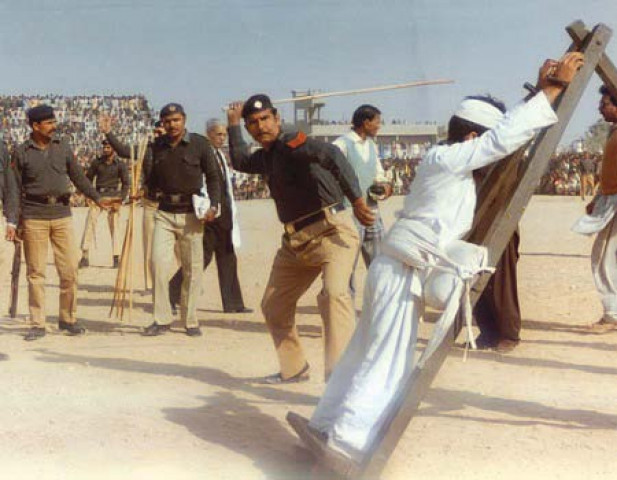Journalists flogged during Zia’s time say they were proud of ‘punishment’
Army officers would watch the floggings along with their families.

Journalists flogged during Zia’s time say they were proud of ‘punishment’
At an event organised by the Karachi Union of Journalists on Monday, audience members had the opportunity to meet four journalists who symbolised the civil society’s struggle against Ziaul Haq’s military dictatorship.
Masoodullah Khan, Nasir Zaidi, Khawar Naeem and Iqbal Jafferi were flogged on May 13, 1978 for protesting for the freedom of the press. In a moment of candor, however, Khan admitted that doctors had declared him to be too frail to withstand the beating, after which he was spared. The ISPR, however, included in its press release his name with the others who were tortured.
Khan said that security agencies had accused him of being “Bhutto’s man.” That was ironic, as journalists were fighting for the freedom of the press at a time when Pakistan Peoples Party workers could not be seen out on the streets. He also lamented that the culprits behind former Punjab governor Salmaan Taseer’s murder were not brought to justice so far.
Amin Yousaf of the Pakistan Federal Union of Journalists said that it was the first time that four “heroes” were being honoured at an event. Yousaf criticised the government for not implementing the wage board act so far, due to which journalists were facing financial difficulties.
Iqbal Jafferi, who started his career in Karachi, pointed out the hardships faced by journalists as they tried to restore democracy during martial law. “We were proud that we were whipped, because we were working for a cause.” Media personnel at the time would be questioned about their “sources of financing”. “[They] would ask if Russia or the PPP was funding us and called us ‘rebels’,” said Jafferi. He added, however, that the struggle for the freedom of the press was still going on.
Khawar Naeem Hashmi said that he was arrested on August 14, 1978, for allegedly “defacing Quaid’s mausoleum.” While recalling his days in captivity from 1978 to 1982, he said that he was forced to take off his clothes before being flogged. Army officers would watch the floggings along with their families.
While talking about the Karachi Press Club, Nasir Zaidi said that the institution plays a big role in raising awareness for protests all over the country. From 1958 to 1970, newspapers were being closed and journalists punished. “We struggled against Zia’s dictatorship just like those before us did during their time.”
Muttahida Qaumi Movement MNA Waseem Akhtar said that the four journalists, through their struggle, had awakened society. He said that journalists should continue to point out irregularities within state institutions and provide direction to society.
MPA Shazia Marri said that her party had always supported the freedom of the media. “I am witnessing history here. I’ve finally met these [brave] journalists.”
Published in The Express Tribune, May 15th, 2012.



















COMMENTS
Comments are moderated and generally will be posted if they are on-topic and not abusive.
For more information, please see our Comments FAQ